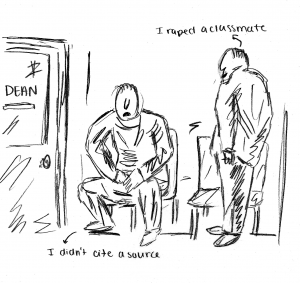COUNTERPOINT: Rapists and abusers should be jailed instead of expelled
For matters of funding and classroom equality, Title IX provides absolutely vital protection for fair representation. The interpretation of Title IX has expanded to urge universities to be the primary actors against sexual assault and domestic violence on campus as well, with increasing numbers of cases of rape and sexual battery being reported solely to universities, resulting in disciplinary action. However, this trend has culminated in a series of grievous injustices, both for the victims of assault and the falsely accused.
In a recent case at Harvard University, undergraduate Alyssa Leader faced consistent violence, including physical and verbal threats and sexual coercion from her boyfriend. Leader’s official report to the university for abuse, sexual assault and harassment was answered with an informal moderation — not a notification of her legal rights to pursue a criminal case or obtain a restraining order —in a distinct violation of Title IX.
The common occurrence of university misconduct like Harvard’s and USC’s own atrocious history of mishandling assault and abuse reports begs the question of why so many victims of these violent crimes choose not to report them to the police, instead opting to inform only university officials or no one at all.
In 2000, the Department of Justice found that fewer than 5 percent of female college rape victims reported their attempted or completed assaults to the police. The same study found that 39.8 percent of women did not report their rapes because they did not want their families to know, and 41.6 percent did not because they did not want any other people to know. The statistics for the reporting of intimate partner violence on college is incredibly sparse. The limited data we do have reveals that intimate partner violence occurs nearly as prevalently as sexual assault on campus, yet dating violence receives a far smaller share of attention from campus activists.
We can deduce from these statistics that fear of the culturally pervasive stigma of being a sexual assault and abuse victim drives students to choose to report these violent crimes to universities instead of the actual authorities. This trend repeatedly obstructs justice for both the accused and the victim.
Given that university administrators are not professionally trained prosecutors or detectives, cases of sexual assault and dating violence often mishandle evidence, mitigating the cases actual victims have and leading to public witch hunts as the Columbia University“Mattress Girl” case did, even after Paul Nungesser was found innocent by the university’s investigation. Twice.
This precedent implies that a heinous, potentially life-ruining crime such as sexual and physical assault can be tried alongside victimless charges such as plagiarism. When colleges encourage students to report their assaults to their authorities instead of the actual authorities, they are saying that the perpetrators deserve expulsion, not prison.
Because the overwhelming majority of college rapes and, by definition, all cases of dating violence, happen with acquaintances, activists in favor of colleges controlling the justice process often argue that leaving the police out of it is a way to encourage victims to seek some justice if they are hesitant to “ruin their assaulter’s life.” This rationale enables the exact modus operandi of rapists and abusers. Rapists and abusers want to use shame to silence their victims.
Obviously, the stigma against rape and abuse is in no way the fault of their victims; however, in immediately reporting these crimes to police and seeking real and fair justice, they can be an integral part of the solution. Rapists and abusers must know that if they can commit monstrous acts of inhumanity, they will be punished justly.
We need to stop encouraging men and women who become the victims of violent crimes to treat them like petty university disputes. It is time for us to accept that university administrators are not a court of law and are unable to properly carry out a dignified and honest ruling of justice.
Tiana Lowe is a sophomore majoring in math and economics. “Point/Counterpoint” runs Tuesdays.


What about those who falsely accuse people of rape?
Please provide credible evidence for the ‘increasing numbers of cases of rape and sexual battery being reported solely to universities’. They may be being reported but how many of them stand up to the rigour of the ‘law’ and how many are morning after ‘regrets’?
I agree with Tiana, but she was vague and weak in her indirect approach. She needed to state unequivocally and directly that “victims of rape and physical abuse need to report the crimes promptly to the police.” Look through her article. She never says that. It should appear in the first and last paragraphs.
Her main point is that universities shouldn’t be handling the cases. Universities encourage reporting to them and discourage reporting to the police. That’s the problem, and that’s what she unequivocally and directly stated.
I agree, Selam. You are correct. That was clearly stated. She just failed to write that victims should call the police themselves, and promptly, rather than mess around with inept or fussy college administrators.